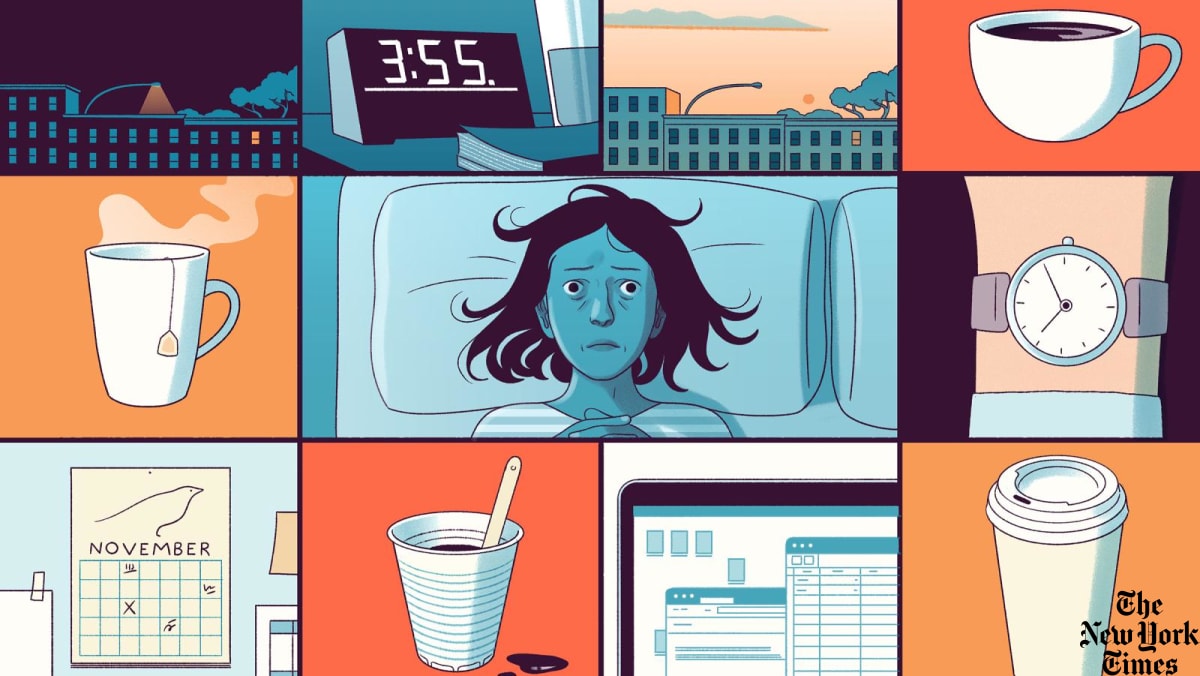Most of us know that good sleep is a pillar of good health, on par with exercise and nutrition. And yet most of us have had a night (or many nights) when it all went sideways.
Maybe you stayed out late and only got six hours, instead of the recommended seven to nine. Maybe your racing brain wouldn’t stop, and you woke up every hour, on the hour. Or maybe you missed a whole night’s rest cramming on a deadline.
Whatever the scenario, a bad night’s sleep can torpedo the next day. Here’s how sleep deprivation affects you and how to mitigate the fallout.
Related:
Is your mind racing just before bedtime? Here’s how to calm it down for a good night’s sleep
Polyphasic sleep: Can snoozing 4 hours a day really improve your alertness, productivity and mood?
Here’s what actually happens in your brain if you get a good night’s sleep – and if you don’t
YOUR SLEEPY BRAIN
Research shows that when people are deprived of sleep, they have slower response times, impaired decision-making, difficulty paying attention and worse memory. People are also more likely to feel anxious, depressed and antisocial.
Scientists typically see these effects in studies where they force people to stay awake for 24 hours, but Eti Ben Simon, a research scientist at the Center for Human Sleep Science at the University of California, Berkeley, said that if you “just take away an hour or two for a couple of nights, you end up seeing the same profile emerging.”
In the brain, these changes show up as less activity in the prefrontal cortex, which is in charge of planning, decision-making and other executive functions. At the same time, there is more activity in the amygdala, an area of the brain involved in feelings of fear and anxiety.
Sleep deprivation can also ramp up the sympathetic nervous system, which controls the “fight or flight” response, causing us to feel stressed and on edge. “Our blood pressure and heart rate response and cortisol response, all of these components of the sympathetic nervous system” are increased without sleep, Dr Ben Simon said.
Related:
Can a nap make up for a bad night of sleep?
Can Pokemon Sleep really help you sleep more? I tried it out for 4 weeks
How sleeping too little can increase your cancer risk
HOW TO CLEAR THE FOG
To mitigate these effects, the number one thing experts recommended is taking a nap. Not only can it help you feel less sleepy, but it can actually improve your performance on many of the cognitive processes that are impaired by lack of sleep.
To avoid the “sleep inertia” some people feel after napping, try to limit yourself to 30 minutes. “You might not even feel like you fall asleep,” said Kelly Baron, a professor of family and preventive medicine at the University of Utah, who treats sleep disorders. “But even getting a little bit of that light sleep can help your brain get some rest and have a boost in your performance.”
Caffeine can also enhance alertness and cognition. Don’t go overboard, though: Too much caffeine can make people feel anxious and jittery and increase heart rate – all of which you may already be experiencing because of lack of sleep.
Regular exercise has been shown to counteract the health consequences of sleep loss in the long-term, and there is some evidence that it improves performance immediately after a bad night of sleep, too. A small 2022 study found that college students who worked out after a night of total sleep deprivation performed better on a test of cognitive control than those who didn’t exercise.
Exposing yourself to bright, natural light is another way to increase alertness, said Soomi Lee, an associate professor of human development and family studies at Penn State University. To get the benefits of both light and exercise, she suggested taking a midday walk.
Related:
Why do some people wake up right before their alarm goes off?
You snooze, you… win? New study suggests hitting that alarm button may not be all that bad
Women have more sleep issues than men, according to research – but why?
DOING DAMAGE CONTROL
While these strategies can help, they won’t completely offset the effects of a bad night of sleep. If you can, make a few adjustments to your day to help you avoid any serious mistakes.
First things first, if you’ve pulled an all-nighter, don’t get behind the wheel. “If you’ve been awake all night, your performance is as bad as if you’re legally drunk,” said Kenneth P Wright Jr, a professor of integrative physiology at the University of Colorado, Boulder, who studies sleep.
When it comes to work, Dr Baron recommended you give yourself more time to finish tasks and avoid multitasking. You could also schedule your day around your circadian rhythm. For most people, energy naturally rises in the midmorning, dips in the early afternoon, and then rises again in the late afternoon or early evening.
“Do your harder tasks when you’re feeling a little bit better,” she said. “And when you have that lull, which is going to feel even worse when you’re sleep-deprived, try to do something that’s maybe a little bit less cognitively straining.”
If possible, avoid having any important or heavy conversations, since lack of sleep can make you more irritable and emotionally reactive. The experts also recommended not making big life or financial moves. “You may not be able to really strategise effectively about all the pieces of information that are necessary to make a decision,” Dr Wright explained.
All that said, the only real cure for a bad night’s rest is to get a good night’s rest the following night.
“The magical solution for sleep loss,” Dr Ben Simon said, “is sleep.”
By Dana G Smith © The New York Times Company
The article originally appeared in The New York Times.











